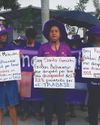The federal government is preparing to end the Caregiver Program – and caregivers are fighting back by demanding permanent residency upon arrival

Kara’s alarm clock barked in her ears at 6 a.m. Guess I’m going back to prison, she sighed to herself. She went downstairs and cooked breakfast for three – the six-year-old boy with special needs she looked after, as well as his two parents, Kara’s employers – while packing three lunches and cleaning last night’s dishes.
Laundry, repairing the washroom sink, cleaning the bedrooms … Kara weighed her hefty workload for the day.
She tried but failed to finish repairing the sink before the boy came home from school. Within an hour the house was messy again – dishes clamouring to be washed and towers of dirty clothing. Why fold your clothes when you can simply drop them for the nanny to pick up, right?
All the while, Kara wondered if she might have some time to visit the doctor this week, since the walk-in clinic was closed on weekends. She had developed some odd spots in her eyes. “I need to see the doctor,” she relayed to the boy’s mother.
“I can’t miss my job just to be with my son,” her boss told Kara. “If you’re going to the doctor, who’s going to replace you?” So, that was that.
By the time she passed out on her bed, it was 10 p.m. Eight hours of pay for 16 hours of work. Should I talk to her about my hours?
Not long after, Kara woke to a text from her employer saying she was fired. “We don’t need you anymore. Don’t come back.”
THE END OF THE CAREGIVER PROGRAM
Kara Manso, a trained nurse from the Philippines, migrated to Canada under the Live-in Caregiver Program (LCP) in 2012, only to find she was overqualified, overworked, and underpaid.
هذه القصة مأخوذة من طبعة November/December 2018 من Briarpatch.
ابدأ النسخة التجريبية المجانية من Magzter GOLD لمدة 7 أيام للوصول إلى آلاف القصص المتميزة المنسقة وأكثر من 9,000 مجلة وصحيفة.
بالفعل مشترك ? تسجيل الدخول
هذه القصة مأخوذة من طبعة November/December 2018 من Briarpatch.
ابدأ النسخة التجريبية المجانية من Magzter GOLD لمدة 7 أيام للوصول إلى آلاف القصص المتميزة المنسقة وأكثر من 9,000 مجلة وصحيفة.
بالفعل مشترك? تسجيل الدخول

PLATFORMS FOR PEOPLE, NOT PROFIT
Digital platforms boast that they’ve “democratized” cultural production. But what would truly democratic platforms look like in Canada?

ORGANIZING THROUGH LOSS IN THE HEART OF OIL COUNTRY
The story of climate justice organizing in Alberta, at the heart of the tarsands, is the story of a group of young activists learning what it means to lose, and keep on fighting

GROWING THE LABOUR MOVEMENT
How unions are using community gardens to engage members, nourish communities, and help strikers weather the picket line

A NEW ERA FOR OLD CROW
In the Yukon’s northernmost community, the Vuntut Gwitchin First Nation is reckoning with how to preserve their land and culture, amid a warming climate and an influx of tourists

“At Least Hookers Get Wages”
The risky business of sex work in the gig economy

The Literal – And Literary – Futures We Build
Briarpatch editor Saima Desai talks to two judges of our Writing in the Margins contest about Idle No More and MMIWG, ethical kinship, writing queer sex, and their forthcoming work.

The Cost Of A T-Shirt
In Honduras, women maquila workers are fighting back against the multinational garment companies that they say are endangering their health and safety.

Milking Prison Labour
Canada’s prison farms are being reopened. But when prisoners will be paid pennies a day, and the fruits of their labour will likely be exported for profit, there’s little to celebrate.

Bringing Back The Beat
In mainstream media, labour journalism has been replaced by financial reporting and business sections. But journalism students are raising the labour beat from the grave.

There's No Journalism On A Dead Planet
Corporate media owners are killing local newspapers – which is making it impossible for everyday people to understand the on-the-ground impacts of the climate crisis